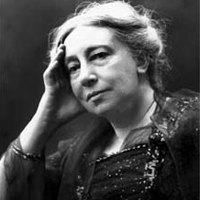Symbolism in Gregory's The Rising of the Moon
The very title of the play The Rising of the Moon is symbolic. The rising of the moon is itself symbolical. The rising of the moon is symbolic of the rising of political awakening and perhaps of an awakening of political independence. By the time Lady Gregory wrote this play, Ireland had been under the reign of the British Empire.

Lady Gregory (1852-1932)
The people of Ireland were not so poor. They lived a better life economically. For the most part Irish people were satisfied with the British rule because their needs and necessities were fulfilled by the British government. Since their basic needs and necessities have already been fulfilled, why raise voice against the British government? Their lives under the British rule were fairly comfortable, that is why they declined to raise voice against the British rule. But there were other Irish people who were not satisfied with the British rule. They used to say that economically secure and physically comfortable lives do not mean that we have to silence our voice for political independence. Fulfillment of hunger and the clothing of naked body are not the ultimate goal of human lives, this is how some of the rebellious Irish people thought.
Political freedom and independence are also equally important thing in life. Thus, they condemned the British government for usurping the Irish political independence. Hence, they decided to fight against the British government. But the fight was going to be costly, going to be pretty risky. The people of Ireland were not wholly conscious, they were not awake to the value of political independence. Although it was difficult to implant political and national awakening in the Irish people, it was not impossible. It was possible, that is why some Irish heroes managed to launch an underground movement against the presence of the British government on the soil of Ireland. Slowly and gradually Irish people came to understand the importance of political independence, national freedom from the bondage of slavery. The consciousness regarding to the national necessity of political independence arose gradually in people. This gradually emerging political awakening is symbolized by the rising of the moon. The rising of the moon is, here, analogous to the rising of political awakening amidst the Irish people. Although some revolutionary Irish leaders prepared the groundwork for national freedom, there was no complete Irish support and sympathy for those Irish revolutionaries. Those Irish people who were working with the British government felt obliged to be loyal to the British government. There was no widespread Irish unity as a stimulating factor for the success of the revolution against the British Regime. Unity amidst the Irish people was supposed to be an indispensable factor for accomplishing the national vision of the Irish Independence. Without having divided opinions, why not become fiercely united over the issue of political independence from the Iron heel of British Tyranny. In the play, The Rising of the Moon sergeant, who is an Irishman in the service of the British government in Ireland and the ballad singer were divided primarily over the issue of the revolutionary cause. But as they came closer physically, they also came closer sentimentally. That is why they reached the position of sharing the pipe. To go to the extent of sharing the pipe both the sergeant and the ballad singer might have come to the level of the sentimental unity. Without having a tenable level of sentimental unity they might not have come to the radical level of revolutionary disposition.
Hence, the rising of the moon is also a symbol of the emerging national unity. It can also be said that the national unity is the major weapon against the British Tyranny. National unity, unity amidst the people of Ireland, and unity amidst the sentiments are productively sure and secure gateway to the triumph of the revolutionary cause.
To cut the long story short, the rising of the moon is the symbol of the emerging vision of the Irish National independence from the clutch of British Tyranny.
